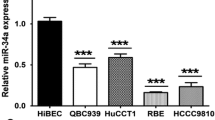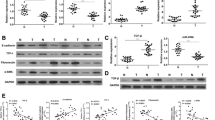Abstract
Background
Increasing evidence has suggested that lncRNA CCAT1 is upregulated and functions as a potential tumor promoter in many cancers. However, the potential biological roles and regulatory mechanisms of CCAT1 in intrahepatic cholangiocarcinoma (ICC) remain unclear.
Methods
We used real-time PCR to measure CCAT1 expression in ICC tissues and the adjacent normal tissues. The statistical analyses were applied to evaluate the prognostic value and associations of CCAT1 expression with clinical parameters. The CCAT1 was silenced with siRNA in ICC cells. The migration and invasion of ICC cells were detected with Transwell assay. The expressions of epithelial–mesenchymal transition (EMT)-related proteins were evaluated to discover whether the process of EMT was involved.
Results
We found that CCAT1 expression was elevated in ICC tissues compared to the adjacent normal tissues. We also found that high CCAT1 expression is closely correlated with tumor progression in ICC patients. Furthermore, our results show that knockdown of CCAT1 significantly suppressed the migration and invasion of ICC cells. Additionally, CCAT1 silencing remarkably reverses the EMT phenotype of ICC cells. Moreover, bioinformatics analysis and luciferase reporter assay revealed that CCAT1 directly bound to the miR-152, which has been reported to serve as a tumor suppressor in variety cancers. Further investigation demonstrated that CCAT1 led to the metastasis and EMT activation of ICC cells through inhibiting miR-152.
Conclusions
Our results suggested that CCAT1 functions as an oncogenic lncRNA in ICC, which could serve as a potential diagnostic and therapeutic target for ICC patients.




Similar content being viewed by others
References
Shaib Y, El-Serag HB. The epidemiology of cholangiocarcinoma. Semin Liver Dis. 2004;24:115–125.
Ebata T, Ercolani G, Alvaro D, et al. Current status on cholangiocarcinoma and gallbladder cancer. Liver Cancer. 2017;6:59–65.
Rizvi S, Gores GJ. Pathogenesis, diagnosis, and management of cholangiocarcinoma. Gastroenterology. 2013;145:1215–1229.
Djebali S, Davis CA, Merkel A, et al. Landscape of transcription in human cells. Nature. 2012;489:101–108.
Gutschner T, Diederichs S. The hallmarks of cancer: a long non-coding RNA point of view. RNA Biol. 2012;9:703–719.
Li Z, Zhou Y, Tu B, et al. Long noncoding RNA MALAT1 affects the efficacy of radiotherapy for esophageal squamous cell carcinoma by regulating Cks1 expression. J Oral Pathol Med. 2016;7:345–351.
Wang D, Wang D, Wang N, et al. Long non-coding RNA BANCR promotes endometrial cancer cell proliferation and invasion by regulating MMP2 and MMP1 via ERK/MAPK signaling pathway. Cell Physiol Biochem. 2016;40:644–656.
Yang G, Lu X, Yuan L. LncRNA: a link between RNA and cancer. Biochim Biophys Acta BBA Gene Regul Mech. 2014;1839:1097–1109.
Nissan A, Stojadinovic A, Mitrani-Rosenbaum S, et al. Colon cancer associated transcript-1: A novel RNA expressed in malignant and pre-malignant human tissues. Int J Cancer. 2012;130:1598–1606.
Guo X, Hua Y. CCAT1: an oncogenic long noncoding RNA in human cancers. J Cancer Res Clin Oncol. 2017;143:555–562.
Zhang XF, Liu T, Li Y, Li S. Overexpression of long non-coding RNA CCAT1 is a novel biomarker of poor prognosis in patients with breast cancer. Int J Clin Exp Pathol. 2015;8:9440–9445.
Ma MZ, Chu BF, Zhang Y, et al. Long non-coding RNA CCAT1 promotes gallbladder cancer development via negative modulation of miRNA-218-5p. Cell Death Dis. 2015;6:e1583.
Li B, Xie Z, Li B. miR-152 functions as a tumor suppressor in colorectal cancer by targeting PIK3R3. Tumour Biol. 2016;37:10075–10084.
Kurayoshi M, Oue N, Yamamoto H, et al. Expression of Wnt-5a is correlated with aggressiveness of gastric cancer by stimulating cell migration and invasion. Cancer Res. 2006;66:10439–10448.
Gray EE, Winship D, Snyder JM, et al. The AIM2-like receptors are dispensable for the interferon response to intracellular DNA. Immunity. 2016;45:255–266.
Jia L, Zhang Y, Tian F, et al. Long noncoding RNA colon cancer associated transcript-1 promotes the proliferation, migration and invasion of cervical cancer. Mol Med Rep. 2017;16:5587–5591.
Jiang C, Li X, Zhao H, et al. Long non-coding RNAs: potential new biomarkers for predicting tumor invasion and metastasis. Mol Cancer. 2016;15:62–65.
Jiang XM, Li ZL, Li JL, et al. Lncrna ccat1 as the unfavorable prognostic biomarker for cholangiocarcinoma. Eur Rev Med Pharmacol Sci. 2017;21:1242–1247.
Zhuang K, Wu Q, Jiang S, Yuan H, Huang S, Li H. CCAT1 promotes laryngeal squamous cell carcinoma cell proliferation and invasion. Am J Transl Res. 2016;8:4338–4345.
Yu Q, Zhou X, Xia Q, et al. Long non-coding RNA CCAT1 that can be activated by c-Myc promotes pancreatic cancer cell proliferation and migration. Am J Transl Res. 2016;8:5444–5454.
Cao J, Liu J, Xu R, et al. MicroRNA-21 stimulates epithelial-to-mesenchymal transition and tumorigenesis in clear cell renal cells. Mol Med Rep. 2016;13:75–82.
Bayoumi AS, Sayed A, Broskova Z, et al. Crosstalk between long noncoding RNAs and MicroRNAs in health and disease. Int J Mol Sci. 2016;17:356–359.
Cesana M, Cacchiarelli D, Legnini I, et al. A long noncoding RNA controls muscle differentiation by functioning as a competing endogenous RNA. Cell. 2011;147:358–369.
Hirata H, Hinoda Y, Shahryari V, et al. Long noncoding RNA MALAT1 promotes aggressive renal cell carcinoma through Ezh2 and interacts with miR-205. Cancer Res. 2015;75:1322–1331.
Liu X, Jiao T, Wang Y, et al. Long non-coding RNA GAS5 acts as a molecular sponge to regulate miR-23a in gastric cancer. Int J Clin Exp Pathol. 2016;9:11412–11419.
Zhou J, Zhang Y, Qi Y, Yu D, Shao Q, Liang J. Microrna-152 inhibits tumor cell growth by directly targeting rtkn in hepatocellular carcinoma. Oncol Rep. 2017;37:1227–1234.
Huang S, Li X, Zhu H. Microrna-152 targets phosphatase and tensin homolog to inhibit apoptosis and promote cell migration of nasopharyngeal carcinoma cells. Med Sci Monit. 2016;22:4330–4337.
Acknowledgments
This study was supported by grants from the National Natural Science Foundation of China (No. 81660409)
Author information
Authors and Affiliations
Corresponding author
Ethics declarations
Conflict of interest
The authors declare no conflict of interest.
Rights and permissions
About this article
Cite this article
Zhang, S., Xiao, J., Chai, Y. et al. LncRNA-CCAT1 Promotes Migration, Invasion, and EMT in Intrahepatic Cholangiocarcinoma Through Suppressing miR-152. Dig Dis Sci 62, 3050–3058 (2017). https://doi.org/10.1007/s10620-017-4759-8
Received:
Accepted:
Published:
Issue Date:
DOI: https://doi.org/10.1007/s10620-017-4759-8




